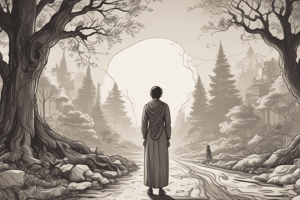Podcast
Questions and Answers
What is a characteristic of novels?
What is a characteristic of novels?
- They are always short stories.
- They are limited to a single genre.
- They typically feature a complex plot, characters, and themes. (correct)
- They are only written in poetry.
In which century did the modern novel originate?
In which century did the modern novel originate?
- 19th century
- 15th century
- 17th and 18th centuries (correct)
- 20th century
Which of the following is an example of an epistolary novel?
Which of the following is an example of an epistolary novel?
- To Kill a Mockingbird
- Dracula (correct)
- The Great Gatsby
- War and Peace
What is the term for a novel that focuses on the growth and development of a young protagonist?
What is the term for a novel that focuses on the growth and development of a young protagonist?
Which author wrote the classic novel 'Pride and Prejudice'?
Which author wrote the classic novel 'Pride and Prejudice'?
Which of the following is a characteristic of stream-of-consciousness novels?
Which of the following is a characteristic of stream-of-consciousness novels?
Which novel is an example of a picaresque novel?
Which novel is an example of a picaresque novel?
Which of the following novels is a contemporary novel?
Which of the following novels is a contemporary novel?
What is the term for a novel that is categorized into different genres?
What is the term for a novel that is categorized into different genres?
Who wrote the novel 'Robinson Crusoe'?
Who wrote the novel 'Robinson Crusoe'?
Flashcards are hidden until you start studying
Study Notes
Novels
Definition and Characteristics
- A novel is a book-length work of fiction that typically features a complex plot, characters, and themes.
- Novels are often written in prose and are usually longer than short stories.
- They can be categorized into different genres, such as romance, mystery, science fiction, and fantasy.
History of Novels
- The modern novel originated in the 17th and 18th centuries in Europe, particularly in England and France.
- Early novels include:
- Daniel Defoe's "Robinson Crusoe" (1719)
- Samuel Richardson's "Pamela" (1740)
- Henry Fielding's "Tom Jones" (1749)
- The 19th century saw the rise of realism and the development of the novel as a popular form of literature.
Novel Forms and Structures
- Epistolary novels: told through a series of letters or documents (e.g. "Dracula" by Bram Stoker)
- Picaresque novels: featuring a rogue or adventurer as the protagonist (e.g. "Don Quixote" by Miguel de Cervantes)
- Bildungsroman: focusing on the growth and development of a young protagonist (e.g. "To Kill a Mockingbird" by Harper Lee)
- Stream-of-consciousness novels: featuring a flowing, unstructured narrative (e.g. "Ulysses" by James Joyce)
Notable Novels and Authors
- Classics:
- "Pride and Prejudice" by Jane Austen
- "War and Peace" by Leo Tolstoy
- "Moby-Dick" by Herman Melville
- 20th-century novels:
- "The Great Gatsby" by F. Scott Fitzgerald
- "To Kill a Mockingbird" by Harper Lee
- "One Hundred Years of Solitude" by Gabriel García Márquez
- Contemporary novels:
- "The Brief Wondrous Life of Oscar Wao" by Junot Díaz
- "The God of Small Things" by Arundhati Roy
- "The Nightingale" by Kristin Hannah
Novels
Definition and Characteristics
- A novel is a book-length work of fiction that typically features a complex plot, characters, and themes.
- Novels are often written in prose and are usually longer than short stories.
- They can be categorized into different genres, such as romance, mystery, science fiction, and fantasy.
History of Novels
- The modern novel originated in the 17th and 18th centuries in Europe, particularly in England and France.
- Early novels include:
- Daniel Defoe's "Robinson Crusoe" (1719), a pioneer of the novel genre.
- Samuel Richardson's "Pamela" (1740), a novel that explores the theme of virtue.
- Henry Fielding's "Tom Jones" (1749), a picaresque novel that follows the adventures of the titular character.
- The 19th century saw the rise of realism and the development of the novel as a popular form of literature.
Novel Forms and Structures
- Epistolary novels: told through a series of letters or documents, such as "Dracula" by Bram Stoker.
- Picaresque novels: featuring a rogue or adventurer as the protagonist, such as "Don Quixote" by Miguel de Cervantes.
- Bildungsroman: focusing on the growth and development of a young protagonist, such as "To Kill a Mockingbird" by Harper Lee.
- Stream-of-consciousness novels: featuring a flowing, unstructured narrative, such as "Ulysses" by James Joyce.
Notable Novels and Authors
- Classics:
- "Pride and Prejudice" by Jane Austen, a romance novel that explores social class and relationships.
- "War and Peace" by Leo Tolstoy, a historical novel that follows the lives of several families during the Napoleonic Wars.
- "Moby-Dick" by Herman Melville, an epic novel that explores the themes of obsession and the human condition.
- 20th-century novels:
- "The Great Gatsby" by F. Scott Fitzgerald, a novel that critiques the American Dream.
- "To Kill a Mockingbird" by Harper Lee, a novel that explores issues of racism and injustice.
- "One Hundred Years of Solitude" by Gabriel García Márquez, a magical realist novel that explores the history of a fictional town.
- Contemporary novels:
- "The Brief Wondrous Life of Oscar Wao" by Junot Díaz, a novel that explores the experiences of Dominican immigrants in the United States.
- "The God of Small Things" by Arundhati Roy, a novel that explores the lives of Indian twins growing up in Kerala.
- "The Nightingale" by Kristin Hannah, a historical novel that explores the lives of two sisters in France during World War II.
Studying That Suits You
Use AI to generate personalized quizzes and flashcards to suit your learning preferences.




